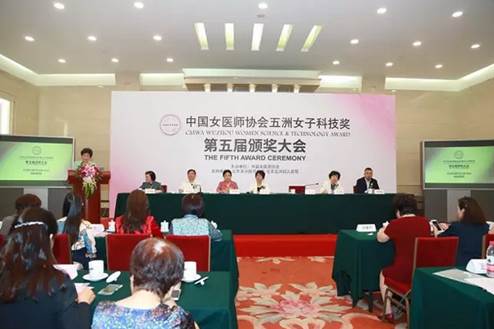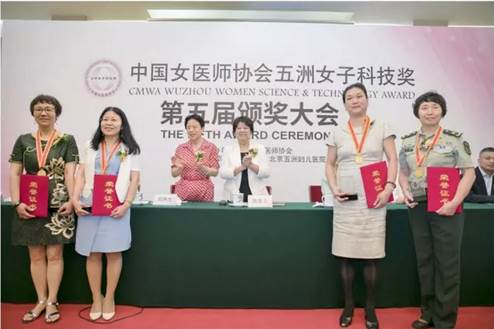王韵教授荣获“中国女医师协会五洲女子科技奖”

2017年7月15日,第五届“中国女医师协会五洲女子科技奖”颁奖大会在北京人民大会堂举行。北京大学神经科学所副所长,神经生物学系副主任、北京大学麦戈文脑科学研究所PI王韵教授获得第五届“五洲女子科技奖”荣誉。

中国女医师协会“五洲女子科技奖”是中国第一个国家科技部批准、国家奖励办备案的女医务工作者终身荣誉科学奖。自2008年开始,每两年评选一次,目前已经评选五届,共123人获奖。第五届中国女医师协会五洲女子科技奖经过单位推荐、形式审查、专家评审、专家终审,最后确定25名获奖者,其中临床医学科研创新奖17名。
个人简介
王韵,博士,北京大学教授。国家杰出青年科学基金获得者。北京大学神经科学所副所长,神经生物学系副主任,兼任中国生理学会秘书长,中国神经科学学会青年委员会副主任委员,中国神经科学学会神经发育与再生专业委员会及教育与继续教育工作委员会委员,北京大学麦戈文脑科学研究所PI。长期致力于痛及痛觉调制信号通路研究,近年重点放在蛋白激酶及其在痛觉及痛觉调制和神经系统发育,损伤及修复中的作用等研究领域。作为课题负责人先后获得了国家自然科学重点,杰出青年,重大国际合作及面上基金,北京市自然科学基金,教育部博士点基金等17项基金资助,作为骨干参与了2项科技部“973”项目,1项国家自然科学基金重点项目及1项教育部创新团队。2001年曾获得教育部高校优秀青年教师称号及奖励基金,2010年获全国优秀科学科技工作者荣誉称号,2011年获北京市教育工会“教育先锋”先进个人称号及2011张香桐神经科学青年科学家奖。
研究方向
王韵课题组主要从事神经系统细胞信号转导的研究。综合利用多学科手段,整合分子生物学、生物化学、遗传学、电生理学、形态学和行为学等方法,主要进行以下两方面的工作:
1. 痛与痛觉调制的细胞信号转导通路:采用慢性病理性疼痛模型,研究痛觉传导通路中,外周和中枢神经发生的可塑性变化,并围绕细胞信号转导的核心分子——蛋白激酶,深入探讨慢性痛、痛相关负性情绪及痛记忆产生的特异的信号通路,以期发现新的镇痛靶点或镇痛药物,为解决临床镇痛问题提供新思路。
2.神经发育和损伤修复机制:采用体外培养细胞和在体动物模型,探讨参与神经元极性建立、迁移、树突发育、突触形成和修剪等神经发育过程,以及外周神经损伤后修复(与发育过程享有一些共同的分子机制)和神经元缺血损伤/抗损伤过程的关键分子,旨在阐明先天性神经发育疾病,神经退行性疾病及后天性神经损伤如机械、缺血损伤等过程的病理机制,找到其中的关键分子,设计可能的干预策略,从而为一些临床常见神经精神疾病的治疗提出新方法。
代表性科研论文
1.Wang GQ*, Cen C*, Cao S*, Li C*, Wang N, Zhou Z, Liu XM, Xu Y, Tian NX, Zhang Y, Wang J, Wang LPCA and Wang YCA. Deactivation of excitatory neurons in the contralateral prelimbic cortex via Cdk5 promotes pain sensation and anxiety. Nature Communications, 2015 in press.
2. Zhang Y*, Wang N*, Su P, Lu J, Wang YCA. Disruption of dopamine D1 receptor phosphorylation at serine 421 attenuates cocaine-induced behaviors in mice. Neurosci Bull. 2014 Dec;30(6):1025-35.
3. Li Y*, Hu F*, Chen HJ*, Du YJ, Xie ZY, Zhang Y, Wang JCA, Wang YCA. LIMK-dependent actin polymerization in primary sensory neurons promotes the development of inflammatory heat hyperalgesia in rats. Sci Signal. 2014 Jun 24;7(331): ra61.
4. Wang N*, Su P*, Zhang Y*, Lu J*, Xing BM, Kang K, Li WQ, Wang YCA. Protein kinase D1-dependent phosphorylation of dopamine D1 receptor regulates cocaine-induced behavioral responses. Neuropsychopharmacol. 2014 Apr;39(5):1290-301.
5. Qi C*, Liu SM*, Qin R*, Zhang Y, Wang GQ, Shang, YF, Wang YCA and Liang JCA. Coordinated Regulation of Dendrite Arborization by Epigenetic Factors CDYL and EZH2. J Neurosci. 2014 Mar 26;34(13):4494-508.
6. Li G, Wang YCA. Protein kinase D: a new player among the signaling proteins that regulate functions in the nervous system. Neurosci Bull. 2014 Jun;30(3):497-504.
7. Wang N*, Su P*, Zhang Y*, Lu J*, Xing BM, Kang K, Li WQ, Wang YCA. Protein kinase D1-dependent phosphorylation of dopamine D1 receptor regulates cocaine-induced behavioral responses. Neuropsychopharmacol. 2014 Apr;39(5):1290-301.
8. Xing BM*, Yang YR*, Du JX*, Chen HJ, Qi C, Huang ZH, Zhang YCA and Wang YCA. Cyclin-dependent kinase 5 controls TRPV1 membrane trafficking and the heat sensitivity of nociceptors through KIF13B. J Neurosci. 2012 Oct 17;32(42):14709-21.
9. Zhu YB*, Kang K*, Zhang Y, Qi C, Li G, Yin DMCA and Wang YCA. PLD1 negatively regulates dendritic branching. J Neurosci. 2012 Jun 6;32 (23):7960-9.
10. Wang KWCA, Wang YCA. Negative modulation of NMDA receptor channel function by DREAM/calsenilin/KChIP3 provides neuroprotection? Front Mol Neurosci. (Invited review) 2012 Mar 15;5:39.
11. Chen HJ*, Xie WY*, Hu F, Zhang Y, Wang J, Wang YCA. Disruption of δ-opioid receptor phosphorylation at Threonine 161 attenuates morphine tolerance in rats with CFA-induced inflammatory hypersensitivity. Neurosci Bull. 2012 Apr;28(2):182-92.
12. Zhang Y*, Su P*, Liang P, Liu T, Liu X, Liu XY, Zhang B, Han T, Zhu YB, Yin DM, Li JF, Zhou Z, Wang KW, Wang YCA. The DREAM protein negatively regulates the NMDA receptor through interaction with the NR1 subunit. J Neurosci. 2010 Jun 2;30(22):7575-86.
13. Xie WY*, He Y*, Yang YR, Li YF, Kang K, Xing BM, Wang YCA. Disruption of cdk5- associated phosphorylation of residue threonine-161 of the delta opioid receptor: impaired receptor function and attenuated morphine antinociceptive tolerance. J Neurosci. 2009 Mar 18;29(11):3551-64.
14. Yin DM, Huang YH, Zhu YB, Wang YCA. Both the establishment and maintenance of neuronal polarity require the activity of protein kinase D in the Golgi apparatus. J Neurosci. 2008 Aug 27;28(35):8832-43.
15. Zhu HH*, Yang YR*, Zhang H, Han Y, Li YF, Zhang Y, Yin DM, He QH, Zhao ZQ, Blumberg PM, Han JS, Wang YCA. Interaction between protein kinase D1 and transient receptor potential V1 in primary sensory neurons is involved in heat hypersensitivity. Pain. 2008 Jul 31;137(3):574-88.
16. He Y, Li HL, Xie WY, Yang CZ, Yu AC, Wang YCA. The presence of active Cdk5 associated with p35 in astrocytes and its important role in process elongation of scratched astrocyte. Glia. 2007 Apr 15;55(6):573-83.
17. Yang YR, He Y, Zhang Y, Li Y, Li YF, Han Y, Zhu HH, Wang YCA. Activation of cyclin-dependent kinase 5 (Cdk5) in primary sensory and dorsal horn neurons by peripheral inflammation contributes to heat hyperalgesia. Pain. 2007 Jan; 127(1-2):109-20.
18. Wang YCA, Kedei N, Wang M, Wang QJ, Huppler AR, Toth A, Tran R, Blumberg PM. The interaction between PKCmu and vanilloid receptor type 1. J Biol Chem. 2004 Dec 17;279(51):53674-82.
19. Wang Y, Xie WY, He Y, Wang M, Yang YR, Zhang Y, Yin DM, Jordan-Sciutto KL, Han JS, Wang Y CA. Role of CDK5 in neuroprotection from serum deprivation by mu-opioid receptor agonist. Exp Neurol. 2006 Dec;202(2):313-23.
20. Wang YCA, Zhang Y, Wang W, Cao Y, Han JS. Effects of synchronous or asynchronous electroacupuncture stimulation with low versus high frequency on spinal opioid release and tail flick nociception. Exp Neurol. 2005 Mar; 192 (1):156-62.
21. Sun RH, Wang HC, Wan Y, Jing Z, Luo F, Han JS, and Wang YCA. Suppression of neuropathic pain by peripheral electrical stimulation in rats: mu-opioid receptor and NMDA receptor implicated. Exp Neurol. 2004 May;187(1):23-9.
22. Wang YCA. The functional regulation of TRPV1 and its role in pain sensitization. Neurochem Res. 2008 Oct;33(10):2008-12. (review)
23. Li Y, Zhang Y, Han JS, Wang YCA. Distinct responses of DREAM to electroacupuncture stimulation with different frequency under physiological and inflammatory conditions in rats. Neurochem Res. 2008 Oct;33(10):2070-7.
24. Zhang Y, Li Y, Yang YR, Zhu HH, Han JS, Wang YCA. Distribution of downstream regulatory element antagonist modulator (DREAM) in rat spinal cord and upregulation of its expression during inflammatory pain. Neurochem Res. 2007 Sep;32(9):1592-9.
25. Wang Y, Toth A, Tran R, Szabo T, Welter JD, Blumberg PM, Lee J, Kang SU, Lim JO, Lee J. High affinity partial agonists of vanilloid receptor. Mol Pharmacol. 2003 Aug;64(2):325-33.
26. Wang Y, Szabo T, Welter JD, Toth A, Tran R, Lee J, Kang SU, Suh YG, Blumberg PM, Lee J. High affinity antagonists of the vanilloid receptor. Mol Pharmacol. 2002 Oct;62(4):947-56.
27. Wang Y, Wang XM, Han JS. Discrimination between peptide and non-peptide opioid agonists on the transcription of opioid receptors in two cell lines. Life Sci. 2001 May 4;68(24):2731-40.
28. Chen ZW, Yang K, Wang YCA, Han JS. The metabolic evidence of synergistic interaction between DAMGO and DPDPE on undifferentiated SH-SY5Y cells. NeuroReport. 2001 Mar 26;12(4):845-9.
29. Chen ZW, Yang K, Wang YCA, Han JS. The metabolic evidence of synergistic effect between ohmefentanyl and [D-Pen2, D-Pen5] enkephalin on differentiated SH-SY5Y cells in humans. Neurosci Lett. 2001 Feb 9;298(3):199-202.
30. Sun R, Wang YCA, Zhao CS, Chang JK, Han JS. Changes in Brain content of nocicepin/orphanin FQ and endomorphin 2 in a rat model of neuropathic pain. Neurosci Lett. 2001 Sep 21;311(1):13-6.
31. Huang C, Wang YCA, Chang JK, Han JS. Endomorphin and mu-opioid receptors in mouse brain mediate the analgesic effect induced by 2 Hz but not 100 Hz electroacupuncture stimulation. Neurosci Lett. 2000 Nov 24;294(3):159-62.
32. Wang Y, Huang C, Cao Y, Han JS. Repeated administration of low dose ketamine for the treatment of monoarthritic pain in rat. Life Sci. 2000 Jun 8;67(3):261-7.
33. Lazar J, Braun DC, Toth A, Wang Y, Pearce LV, Pavlyukovets VA, Blumberg PM, Garfield SH, Wincovitch S, Choi HK, Lee J. Kinetics of penetration influence the apparent potency of vanilloids on TRPV1. Mol Pharmacol. 2006 Apr;69(4):1166-73.
34. Zhang Y, Xiang B, Li YM, Wang Y, Wang X, Wang YN, Wu LL, Yu GY. Expression and characteristics of vanilloid receptor 1 in the rabbit submandibular gland. Biochem Biophys Res Commun. 2006 Jun 23;345(1):467-73.
35.Toth A, Wang Y, Kedei N, Tran R, Pearce LV, Kang SU, Jin MK, Choi HK, Lee J, Blumberg PM. Different vanilloid agonists cause different patterns of calcium response in CHO cells heterologously expressing rat TRPV1. Life Sci. 2005 May 6; 76(25):2921-32.
36. Lee J, Jin MK, Kang SU, Kim SY, Lee J, Shin M, Hwang J, Cho S, Choi YS, Choi HK, Kim SE, Suh YG, Lee YS, Kim YH, Ha HJ, Toth A, Pearce LV, Tran R, Szabo T, Welter JD, Lundberg DJ, Wang Y, Lazar J, Pavlyukovets VA, Morgan MA, Blumberg PM. Analysis of structure-activity relationships for the 'B-region' of N-(4-t-butylbenzyl)-N'-[4-(methylsulfonylamino)benzyl]-thiourea analogues as TRPV1 antagonists. Bioorg Med Chem Lett. 2005 Sep 15;15(18):4143-50.
37. Lee J, Kang SU, Kil MJ, Shin M, Lim JO, Choi HK, Jin MK, Kim SY, Kim SE, Lee YS, Min KH, Kim YH, Ha HJ, Tran R, Welter JD, Wang Y, Szabo T, Pearce LV, Lundberg DJ, Toth A, Pavlyukovets VA, Morgan MA, Blumberg PM. Analysis of structure-activity relationships for the 'A-region' of N-(4-t-butylbenzyl)-N'-[4-(methylsulfonylamino)benzyl]thiourea analogues as TRPV1 antagonists. Bioorg Med Chem Lett. 2005 Sep 15;15(18):4136-42.
38. Lee J, Kang SU, Lim JO, Choi HK, Jin MK, Toth A, Pearce LV, Tran R, Wang Y, Szabo T, Blumberg PM. N-[4-(Methylsulfonylamino)benzyl]thiourea analogues as vanilloid receptor antagonists: analysis of structure–activity relationships for the ‘C-Region’. Bioorg Med Chem. 2004 Jan 15;12(2):371-85.
39. Lee J, Kim SY, Lee J, Kang M, Kil MJ, Choi HK, Jin MK, Wang Y, Toth A, Pearce LV, Lundberg DJ, Tran R, Blumberg PM. Analysis of structure-activity relationships with the N-(3-acyloxy-2-benzylpropyl)-N'-[4-(methylsulfonylamino)benzyl]thiourea template for vanilloid receptor 1 antagonism. Bioorg Med Chem. 2004 Jul 1;12(13):3411-20.
40. Lee J, Kang SU, Choi HK, Lee J, Lim JO, Kil MJ, Jin MK, Kim KP, Sung JH, Chung SJ, Ha HJ, Kim YH, Pearce LV, Tran R, Lundberg DJ, Wang Y, Toth A, Blumberg PM. Analysis of structure-activity relationships for the 'B-region' of N-(3-acyloxy-2-benzylpropyl)-N(')-[4-(methylsulfonylamino)benzyl]thiourea analogues as vanilloid receptor antagonists: discovery of an N-hydroxythiourea analogue with potent analgesic activity. Bioorg Med Chem Lett. 2004 May 3;14(9):2291-7.
41. Tang XQ, Wang Y, Huang ZH, Han JS, Wan Y. Adenovirus-mediated GDNF ameliorates corticospinal neuronal atrophy and motor function deficits in rats with spinal cord injury. NeuroReport. 2004 Mar 1;15(3):425-9.
42. Fang M, Wang Y, He QH, Sun YX, Deng LB, Wang XM, Han JS. Glial cell line-derived neurotrophic factor contributes to delayed inflammatory hyperalgesia in adjuvant rat pain model. Neuroscience. 2003;117(3):503-12.
43. Tóth A, Kedei N, Wang Y, Blumberg PM. Arachidonyl dopamine as a ligand for the vanilloid receptor VR1 of the rat. Life Sci. 2003 Jun 13;73(4):487-98.
44. Lee J, Lee J, Kang M, Shin M, Kim JM, Kang SU, Lim JO, Choi HK, Suh YG, Park HG, Oh U, Kim HD, Park YH, Ha HJ, Kim YH, Toth A, Wang Y, Tran R, Pearce LV, Lundberg DJ, Blumberg PM. N-(3-Acyloxy-2-benzylpropyl)-N'-[4-(methylsulfonylamino)benzyl] thiourea Analogues: Novel Potent and High Affinity Antagonists and Partial Antagonists of the Vanilloid Receptor. J Med Chem. 2003 Jul 3;46(14):3116-26.
45. Tóth A, Kedei N, Szabó T, Wang Y, Blumberg PM. Thapsigargin binds to and inhibits the cloned vanilloid receptor-1. Biochem Biophys Res Commun. 2002 May 3;293(2):777-82.
46. Huang C, Wang Y, Han JS, Wan Y. Characteristics of electroacupuncture-induced analgesia in mice: variation with strain, frequency, intensity and opioid involvement. Brain Res. 2002 Jul 26;945(1):20-5.
47. Tang XQ, Wang Y, Han JS, Wan Y. Adenovirus-mediated GDNF protects cultured motoneurons from glutamate injury. Neuroreport. 2001 Oct 8;12(14):3073-6.
48. Sun RQ, Zhao CS, Wang HJ, Jing Z, Wang W, Yang K, Wang Y, Chang JK, Han JS. Nocistatin, a peptide reversing acute and chronic morphine tolerance. Neuroreport. 2001 Jun 13;12(8):1789-92.
49. Fang M, Wang Y, Liu HX, Liu XS, Han JS. Decreased GDNF expression in dorsal spinal cord of unilateral arthritic rat. NeuroReport. 2000 Mar 20;11(4):737-41.
50. Zhao CS, Li BS, Zhao GY, Liu HX, Luo F, Wang Y, Tian JH, Chang JK, Han JS. Nocistatin reverses the effect of orphanin FQ/nociceptin in antagonizing morphine analgesia. NeuroReport. 1999 Feb 5;10(2):297-9.
51. Han Z, Jiang YH, Wan Y, Wang Y, Chang JK, Han JS. Endomorphin-1 mediates 2 Hz but not 100 Hz electroacupuncture analgesia in the rat. Neurosci Lett. 1999 Oct 22;274(2):75-8.